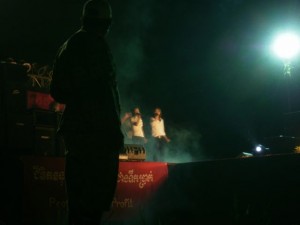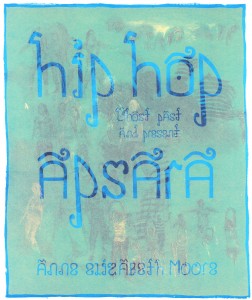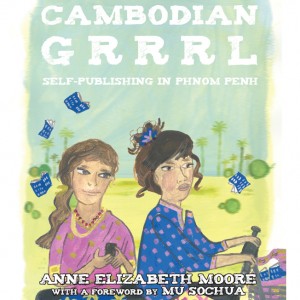Standing Up and Speaking Out: Hip Hop Apsara
A blizzard in central Europe delayed my last flight to Phnom Penh by 30 hours, so I was sleeping poolside at my hotel when I got a text from Saem Vun, a singer with a musical group called The Messenger Band.

Hip Hop Apsara: Ghosts Past and Present. The police chief looks on as the Messenger Band performs. Photo by Anne Elizabeth Moore. Copyright 2012. All rights reserved.
I have known Saem since I chanced upon a concert she and her bandmates had given a year previous. The group was formed in 2005 by the now-defunct Cambodian NGO Womyn’s Agenda for Change, in order to bring the concerns of garment workers back to the provinces from which these young women originally hailed. Over 300,000 women uphold the nation’s third-largest industry, directly supporting over 20% of the nation’s 14 million inhabitants by sending money back home to farming families. In fact, young women are often sent by parents to the city for this express purpose.
Saem worked in the factories from 2000 to 2005, but now works full-time with the band. “We are tired but we say nothing,” one song goes. “We are hard working and much of this money I earn is dollars to help my mother.”The Messenger Band writes songs about garment workers in the traditional Cambodian folk style, and choreographs moves to accompany their laments. Villagers are riveted: the subjects of these songs are their daughters, their nieces, their friends. More interesting, the subjects of the songs are also members of The Messenger Band. Being former or current garment factory workers themselves, the varying group of women that perform as the band are well-versed in the issues that affect women in Cambodia.
But back to that text: it’s an invitation to go on tour with Cambodia’s only all-girl political rock band.
We pull up to a dusty field in Chrey Royoung village, Kondok commune, in the Kandal Steung district of Kandal Province. To the left, a metal roof covers a concrete floor. People busy themselves inside it. At the far end, a giant black square sits incongruously on the parched and carved land, plowed after the last rain a month ago, now hardened into grooves about eight inches high. A rusty pickup truck backs towards the shape, and a gaggle of thin, brown young men begin unloading 12 massive speakers.

Hip Hop Apsara: Ghosts Past and Present by US author and journalist, Anne Elizabeth Moore
The people that have been busying themselves under the metal awning are finally ready for us a few hours later, and have decked out their standard-issue light blue plastic chairs with elaborate gold sateen covers and politely bagged all the table settings in plastic. They have also prepared no small amount of food: steamed fish in giant kettles, a dish made from local vegetables and tiny unshelled shrimp, chicken, and a coconut dessert. Visitors are handed prim bottles of water – a gift just for coming! Already seated are police chiefs,local officials, and several major authority figures.
A smartly dressed woman, long hair tied back, with a deep-colored silk kroma perfunctorily positioned around her neck, asks me in English (lilted with a slight French accent) to sit next to her. We are partway through the meal before I realize that the deference others grant her is due to the vast political power she holds—she is the Deputy District Governor—but by then we have already bonded over not having husbands. Being unmarried in Cambodia as a woman is okay under certain conditions—if you are exemplary, for example, or foreign.
Generally speaking, young women here are expected to have families. So expected, in fact, that women are assumed, without query, to be married already. To my left, for example, the villagers ask Saem about her husband, and what the husbands of the band members are expected to do when their wives travel so frequently.
Saem retorts sharply, but with humor: the women all laugh, and the village official next to me concurs. “What did you say?” I have to ask my friend, as my Khmer is mostly limited to words for baby animals.
“They ask where my husband. I say, if it good enough for your leader to have no husband it good enough for me,” Saem answers.
Still, I know Saem has a partner she misses when she travels, and if they hadn’t moved to the big city to work in the factories, all the women in the band would still live at home. In fact, all unmarried women I know in the country still live at home, and return home before dinner, promptly, every night.
After dinner: we must get ready. The band rushes off to change into their costumes, and the MCs take the stage and offer rambling greetings to the gathered crowd, slowly pulling them away from the balloon-popping carnival games, a corn vendor, a sugarcane stand. Soon the whole town is crouched or seated, in the dry, ridged field in preparation for the concert. And yet the MCs ramble on.
When The Messenger Band takes the stage, they are decked in traditional Cambodian dress: red or orange sampot, gold-trimmed and elaborately folded; white silk top with lace, elaborate hair styles. Big movements in such outfits are not possible; these women will take small steps andmake graceful gestures, never raising their arms above their heads triumphantly or bounding from one side of the stage to another. Gracefulness in Cambodian dance is about attentiveness to detail and extreme, if sometimes awkward and excruciatingly slow, gestures.
Slowly, then, the band opens with an appropriate introductory song about the construction work and garment industry in Phnom Penh. A few players perform a skit about domestic violence and alcohol abuse. It is didactic for a reason: some sources estimate that around one in five women here is a victim of spousal abuse. Then, another song. Then, a fashion show. Finally, some local youth are called up on stage in sort of a quiz-show style game. It mimics the way lessons are taught in grade schools here, taught in grade schools everywhere: it’s the “fun,” “interactive,” “educational” part of the show, where we really get to test whether or not the lesson has sunk in. They answer questions about safe sex, about the number of women employed in the garment industry, about access to health care. Then, another skit about money-lending. A song about rice farming.mpot, gold-trimmed and elaborately folded; white silk top with lace, elaborate hair styles. Big movements in such outfits are not possible; these women will take small steps andmake graceful gestures, never raising their arms above their heads triumphantly or bounding from one side of the stage to another. Gracefulness in Cambodian dance is about attentiveness to detail and extreme, if sometimes awkward and excruciatingly slow, gestures.
After an epic five-hour concert in the middle of an abandoned field in Southern Cambodia, we go home.
I had earlier recorded an interview with Saem about The Messenger Band, and I thought about it on the drive back to the city. “Why would garment factory workers start a band?” I’d asked her.
“When I was working in the factory, I saw a lot of problems. I want to see change.It’s important for investors, they have to follow the law in Cambodia and they have to respect worker’s rights. … forced overtime and low wage. And have to ask permission for when they get sick. It’s really difficult to take leave. And sometimes, workers are dismissed by the company because they cannot go to work, like when they got sick, they have to go to the hospital. But the factory owners, they don’t allow them to go.”
“Are you nervous being an activist in Cambodia?” I asked her. Workers here are scared to agitate for their rights, because they have jobs to lose. Activists in Cambodia put much more on the line. Many are threatened, some are harmed, and occasionally someone goes into hiding. Murders also happen.
“Hmmm, a little bit. … But if we don’t stand up, no one hears the story. And that’s why we have to stand up and share some information about the poor people in Cambodia. We have to stand up and speak out; otherwise, we die,” she told me.
—

Category: Contemporary Women Writers, US American Women Writers





Comments (1)
Trackback URL | Comments RSS Feed
Sites That Link to this Post